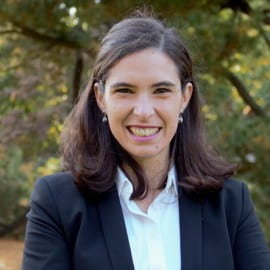Applied Micro Mini Day #2
Date: November 13th, 2023
Address:
NYU Stern School of Business
44 West 4th Street
Room KMC 4-90
New York, NY 10012
Registration is required for Participation.
Speakers:
 1. Hanno Foerster (Boston College)
1. Hanno Foerster (Boston College)
“The Colocation Friction: Dual-Earner Job Search and Labor Market Outcomes” — joint with Robert Ulbricht (Boston College)
Abstract: Dual-earner households face a colocation problem: They need to find two jobs in one location. We develop a spatial directed search model that captures the unique friction that characterize the job search by dual-earner households. We derive general conditions under which this “colocation friction” is binding and quantify its consequences for the U.S. labor market. Estimated at the commuting zone level, the model implies that the colocation friction disproportionately affects women, reducing their short-term earnings gains from migration by 76%. The colocation friction further discourages migration, especially among “power couples”, preempting relocation to more productive and higher-amenity locations in the long-run. Taken together, we estimate that the colocation friction incurs a lifetime utility loss equivalent to a 1.4% decrease in lifetime earnings.
 2. Paula Calvo (Arizona State University)
2. Paula Calvo (Arizona State University)
“The Effects of Institutional gaps between Cohabitation and Marriage”
Abstract: This paper examines the effects of institutional differences between marriage and non-marital cohabitation on household formation, individual’s welfare, and child human capital. I first show that conditional on observable characteristics, cohabiting couples have, on average, higher separation rates, higher female labor supply, and worse cognitive outcomes among their children, relative to married couples. To explain these empirical findings, I model the individuals’ life-cycle problem within an equilibrium marriage market framework that features the choice between marriage and cohabitation. I estimate the model using U.S. household data. The results indicate that non-college educated cohabiting women receive a lower share of the household’s resources than low-educated married women. Moreover, consistent with the empirical findings, their children accumulate less human capital compared to those born to low-educated married women, explained by lower maternal time investments and higher separation rates between cohabiting couples. In counterfactual analysis, I equalize child custody laws for unmarried and married parents upon separation. I find that this policy would improve the welfare of low-educated cohabiting women and the outcomes of their children. Accounting for marriage market equilibrium effects is critical for this result: Under the baseline equilibrium, this policy change would reduce the welfare of low-educated cohabiting women (by reducing their parental rights upon separation). However, in the new marriage market equilibrium, these women would be compensated with a higher share of the household’s resources, which induces them to form cohabiting relationships. This policy also contributes to closing the human capital gap between children born to low-educated cohabiting and married women.
 3. Anders Humlum (University of Chicago)
3. Anders Humlum (University of Chicago)
“Gaining Steam: Technology Switching and Entrant Leapfrogging in the Long Transition from Waterpower” — joint with Richard Hornbeck (University of Chicago), Shanon Hsuan-Ming Hsu (University of Chicago), and Martin Rotemberg (New York University)
The schedule is:
12:00 PM – 1:10 PM Lunch
1:15 PM – 2:15 PM: Hanno Foerster
2:15 PM – 2:45 PM Coffee Break – 30 minutes
2:45 PM – 3:45 PM Paula Calvo
3:45 PM – 4:00 PM Stretch Break – 15 minutes
4:00 PM – 5:00 PM: Anders Humlum
Organizer: Sharon Traiberman
